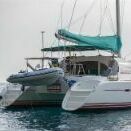Leaderboard
Popular Content
Showing content with the highest reputation on 09/01/16 in all areas
-
If it had been me there, I would have at least checked that there's a correlation between the two, since it's Tommy's only way of measuring his battery voltage. I would not have had to refer to my notes for that basic check. Especially if I had been arguing for ages that a Smartgauge doesn't do a good job! (Maybe not your exact words.) I'm not making fun of you at the moment. I stopped doing that when you appeared to accept that marina charging regimes differ from towpath ones. But I still regard you as a good theoretician only, being a little short of outdoor experience.3 points
-
Due to health issues we try to stay within 1 1/2hrs of the hospital (by road). We still manage to travel at least 350miles per year of just pottering around. So anyone who has a problem with moving in less than a 20 mile range should seriously think about giving up. Just my opinion3 points
-
2 points
-
2 points
-
I've thought about these proposals and in order to comply with 20 miles a year without staying in one place for more than 14 days, then once every fortnight the boater has to flog himself up the cut for NEARLY A MILE!!! When you take into account casting off and mooring this could easily take half an hour.Every fortnight. That's 13 hours a year!!! pretty well a whole day a year whipped along by the fear of losing your home!!! Do they think boaters don't have a life beyond the tiller? This means that with the metphorical CaRT gun at their head the poor bugger is forced to do the kind of mileages a liesure boater may take nearly a whole weekend to do and cram it into just one year!!! I can see why this needs legally challenging. It's worse than the nazis.2 points
-
If you cill and then sink your 58ft boat in a "57" ft lock I'm sure it would give the insurers a great reason to avoid paying out a claim, so I don't understand the 58-59ft boats available. It's also boat design as well - a 55ft boat with a small foredeck may well give more internal space than a 57ft with "wasted" space there and then you get cheaper moorings, licence as mentioned before1 point
-
1 point
-
Thank you for a tired grin, I really don't care how you regard me. With regard to accepting towpath regimes. I have probably prepared more boats than you have to exist off grid. There was always a problem, but maybe I have, thank to something someone said I may have a solution to that. But a few months of playing with the idea so laypeople can use it. Now I am going to drive to my boat, have a cuppa and go to bed. I am just wondering whether I will bother to post the details. No reason why I should when I think about it.1 point
-
This post cannot be displayed because it is in a forum which requires at least 10 posts to view.
-
Too many adjectives. The culture of lying isn't "proven" and decisions aren't "arbitrary". I've been boating for thirty years without a single problem with BW or CRT, probably because I mostly don't try to live on the margins of what is permissable (legally or practically), and when I have, I've kept my head down, not made a fuss and stayed comfortably under the radar. If you think it hold all the cards, maybe you ought to start keeping some of your own, like your own detailed log of your travels and why you are fully compliant (assuming you are and always have been). And, of course, CRT is entitled to decide whether it's satisfied or not - it's legally obliged to. Nothing arbitrary about it, just sometimes there are disagreements over interpretation of the law. As I said, it's dodgy on the margins - if you don't want hassle, don't try and live there.1 point
-
I sometimes think that if some people spent as much time moving as they spent worrying about not moving, it's unlikely they'd have a problem.1 point
-
Perhaps we can crowd fund an all-in-one printer or a camera for you Is it really impossible to post this information now?1 point
-
Evening all. I think we have a result. The cable from the charge to the batteries had a volt drop of 4% approx thus 15.1 at the charger was only was 14.51 volts at the battery. Cable and all connections up graded. So now 15.1 at the charger is 14.94v at the battery. Generator is now work harder going by the noise increase suggesting more power getting to the battery. I have lots of figures etc which I need to fully analyse and that will have to wait until I get home and recover from trip probably Wednesday or Thursday next week.1 point
-
I sat, painfully, through the whole process of setting out the very first compulsory set of BSS 'Standards' and the associated checking points. The starting point was the Thames Launch Regs( because otherwise the EA would not play) which were then garnished by the bees from the bonnets of the more prominent marine surveyors operating in the canal world at the time. The whole process was managed by a man without any professional marine engineering training or experience. He absolutely refused to look at any form of risk-based justification or to provide any justification for any standard or checking point. His approach to real-world Standards was to comb the BSI catalogue and attempt to mandate anything that had a vaguely relevant title.He was also not interested in any form of Quality Assurance or control, examiner competence checks, pre-entry competences for examiners or any of the trappings of a sound scheme, except (IMO) ensuring he kept his job going for as long as possible. He also would not acknowledge the existence of the budding RCD. The behaviour of the IWA and the RYA in all of it was disgraceful, as they, between them had the political clout to have had BW bring in a properly justified scheme, but they broadly ignored any inconvenient evidence. As a result the initial BSS was over-prescriptive, terribly expensive to boaters and had to be radically revised after the Ombudsman decided against BW on several matters where they were changing the rules as they went along. It still would benefit from being properly done, and made congruent with the RCD, but it won't be, because that would be to admit that a proper balls up was made. N1 point
-
Put, narrow boat brokers in google (other search engines are available) and you will be spoilt for choice.1 point
-
The only honest brokerage I have ever dealt with is " Rugby Boats " Whilton is great for window shopping. Tim1 point
-
Whilton is only for looking - you don't buy from them. Many, stories with the bad far out weighing the good.1 point
-
A classic case for the use of the legal 'reasonable' phrase which, despite its apparent lack of precision, has an honourable and reliable basis. What it would mean in this case is that if a boater challenged CaRT's failure to be satisfied that they have engaged in bona fide navigation then the court would apply a reasonableness test - what would the person on the Clapham Omnibus think was right? So, just to speculate: if CaRT say that they are unlikely to be satisfied with a travel pattern less than x miles and then they declared themselves not satisfied by a journey that is twice x, then it could well be anticipated that they might have that lack of satisfaction declared unreasonable, whilst a boater who said that they had a pattern which was x miles less a few metres ought to be accepted then CaRT's lack of satisfaction might be declared reasonable, unless very specific circumstances were cited by the boater. After all, the legislation uses the phrase 'reasonable in the circumstances' with regard to overstaying - a different but related issue. As has been already stated, if a boater seeks a much tighter definition then they are likely, on a reasonableness test, to be considered not bona fide navigating almost by their own admission. 'Reasonableness' is a much more helpful concept in the context of widely varying circumstances and a lack of clear statutory rules.1 point
-
I must admit it amazes me how much this forum witters on about what is and isn't law. I know no other situation where people as so quick to rush to the minutiae of the law and try to interfere with an organisation trying to get on with their job. I have my asbestos underwear on as I know that will be a very unpopular viewpoint.1 point
-
But without them a decent bridge strike would require a time consuming prepare on the GRP cabin top and possibly a lost weeks hire. However it may have a steel cabin & roof but "roof cap" sounds like something a bit bodgy to me, maybe just sheets of ply screwed onto the GRP roof? To the OP. Unless all your bridge holes are rectangular in section and you have no tunnels the air draft is of minor importance. It is all too easy to get the boat off centre on an arched bridge and scrape the cabin side or even fold the front overhang back - especially if you are a new hirer. I used to run the engineering side of a large Thames hire fleet and your posts fill me with concern. Unless you are intending to be a bargain basement price operator I do not thing using an old Harborough marine boat will answer for many hirers. The shape is far too distinctive and it shouts 30 to 4 years old. I have no idea about your skill set but I also feel a DIY refit may not answer in today's market for hiring. Then there is the question of getting sufficient battery charge for a hire boat (with all the expected mod-cons) from an air cooled Lister. (See this thread http://www.canalworld.net/forums/index.php?showtopic=77929). The last thing you will want is to be taking spare charged battery sets to those hirers who undertake a very short distance pub crawl each day. I think that you may well be on track to loose a lot of money, let alone your time.1 point
-
I heard it was broken a few months ago by a BIG tractor and trailer...Kids couldn't break one of these Llangollen steel wind up lift bridges.. The most common reason they need repair is when a boat hits them and jams the hinge.. Casp'1 point
-
Wrong answer, the OP is looking for another stick to beat CRT with, and wants everyone to say 'NO, NO BASIS IN LAW'!1 point
-
In a word yes. A basis in a sense they are starting with the 1995 act and what they say about it is correct. However a guideline is just that it is not law. If one accepts the point that the "board" must be satisfied that a boater without a home mooring is being used for bonafide navigation it is not unreasonable to outline what would satisfy them. Many people complain that there is not enough info on what the distances are. Quite frankly if anyone finds it hard to move in the range specified over the term of their licence they need to make a change. It is very easy to comply with the guideline.1 point
This leaderboard is set to London/GMT+01:00















